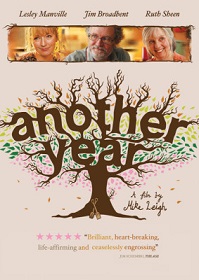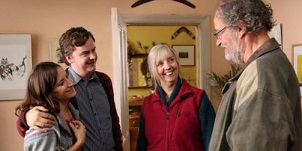In honor of the New Year, this entry is about British director Mike Leigh’s Another Year.
 I found Another Year—despite being a movie about people of a different generation and living in a different country than myself—to be very relevant and relatable. This movie depicts the absolute normalcy of both happiness and unhappiness. The movie begins with a depressed elderly woman in a doctor’s office asking for medication to help her with her insomnia—one of the many parts of her life that seems to be making her miserable. When we see this depressed woman (who says she is 1 out of 10 on the scale of happiness!), we wonder, “How in the world did she end up like this?? What terrible things have happened in her life?” But I believe this movie gently suggests that the difference between a happy life and a miserable one is more subtle.
I found Another Year—despite being a movie about people of a different generation and living in a different country than myself—to be very relevant and relatable. This movie depicts the absolute normalcy of both happiness and unhappiness. The movie begins with a depressed elderly woman in a doctor’s office asking for medication to help her with her insomnia—one of the many parts of her life that seems to be making her miserable. When we see this depressed woman (who says she is 1 out of 10 on the scale of happiness!), we wonder, “How in the world did she end up like this?? What terrible things have happened in her life?” But I believe this movie gently suggests that the difference between a happy life and a miserable one is more subtle.
In this movie, we follow the lives of two women—Gerri and Mary—over the course of a year. At the beginning, they don’t seem too different—middle-aged, working stable jobs in the same health center, often sharing a casual drink or meal together. However, over the year, it becomes clear that the two are in very different places in their lives.
 Gerri is happily married to a loving husband. Their love is apparent, though never dramatically so—a nice passing compliment, or enjoying a warm cup of tea after a day in the garden together. Most evenings are spent quietly sharing their days over a nice meal, listening to music, or reading in bed next to each other. Gerri also has a sweet son who visits regularly, works out in the garden with his parents at times, and one day brings home a nice girlfriend.
Gerri is happily married to a loving husband. Their love is apparent, though never dramatically so—a nice passing compliment, or enjoying a warm cup of tea after a day in the garden together. Most evenings are spent quietly sharing their days over a nice meal, listening to music, or reading in bed next to each other. Gerri also has a sweet son who visits regularly, works out in the garden with his parents at times, and one day brings home a nice girlfriend.
Mary, on the other hand, is single and seems to be trying to pick herself up from a recent relationship she unfortunately had with a married man. She is a pretty woman, but she says that men are disappointed when they find out she is older than they thought. She drinks and smokes a little too much when she is stressed—such as when she is reminded of her singleness or has difficulties with her new car—which of course causes her to be more sad and desperate. She seems to just be realizing that she is getting old, doesn’t like where her life is now, and is becoming increasingly discouraged by her prospects. She is simultaneously comforted by the supportiveness of Gerri as a friend and sadly reminded of her own loneliness when she sees Gerri happily with her husband and son.
Both Gerri’s happiness and Mary’s unhappiness were reached by a series of small steps. Gerri appears to have embarked on a good path years ago that led her to a happy life, while Mary’s choices appear to have led her down a path of unhappiness. Perhaps when Gerri married a man who she would be pleasantly sharing a meal with 30 or so years later, Mary got involved with a man who would later devastate her. While Gerri spends her time enjoying hobbies she was able to develop with her husband, Mary impulsively buys a car in hopes that it will empower her and make her feel less unhappy, only to find that it causes her all sorts of grief. The sad elderly woman in the first scene could be Mary in a couple of decades if Mary is not able to turn her life around and find happiness.
 I fear that Mary will not be able to. Why? It is not only what choices we make—because there is no way for anyone to really predict how their choices might play out in 5, 10, 30 years—but also how we deal with what happens in life. Depression is a very dangerous and trapping cycle where every little defeat is discouraging, and that discouragement only sets one up for another defeat. For example, Mary drinks when she is upset, acts pitifully when drunk, and then is embarrassed by her actions. Also, she is disheartened by perceived failures from non-attempts, such as when the man she is eying across the bar ends up having a wife or when Gerri’s son brings home a girlfriend; neither man was actually rejecting her, but she will take it that way. On the other hand, when a clumsy and overweight friend of Gerri’s attempts to flirt with Mary, she is upset, not flattered, by this, likely because she is reminded of her own age and singleness. Mary is also quite harsh on herself, calling herself stupid and getting hung up on little mistakes she makes. This tendency to focus on failures and perceive everything negatively makes it very challenging to be happy with what happens in life. Just like happiness is found in all those ordinary moments we see in Gerri’s life, misery can also just be an accumulation of ordinary moments perceived through a negative filter.
I fear that Mary will not be able to. Why? It is not only what choices we make—because there is no way for anyone to really predict how their choices might play out in 5, 10, 30 years—but also how we deal with what happens in life. Depression is a very dangerous and trapping cycle where every little defeat is discouraging, and that discouragement only sets one up for another defeat. For example, Mary drinks when she is upset, acts pitifully when drunk, and then is embarrassed by her actions. Also, she is disheartened by perceived failures from non-attempts, such as when the man she is eying across the bar ends up having a wife or when Gerri’s son brings home a girlfriend; neither man was actually rejecting her, but she will take it that way. On the other hand, when a clumsy and overweight friend of Gerri’s attempts to flirt with Mary, she is upset, not flattered, by this, likely because she is reminded of her own age and singleness. Mary is also quite harsh on herself, calling herself stupid and getting hung up on little mistakes she makes. This tendency to focus on failures and perceive everything negatively makes it very challenging to be happy with what happens in life. Just like happiness is found in all those ordinary moments we see in Gerri’s life, misery can also just be an accumulation of ordinary moments perceived through a negative filter.
This easily discouraged mindset is very hard to break free from and unfortunately many people today are stuck in it. When people can only think of the negative parts of life, they lose hope for their future and become detached from the people and moments around them. In the most extreme situation, this could result in suicide. Because of Mary’s focus on the negative, it seems that she does not know how to be happy with herself, and therefore seeks out external sources of happiness—such as a man or a new car. This movie also seems to critique the use of drugs as a quick-fix to unhappiness in the first scene when the depressed woman demands medication. Mary needs to figure out what she wants, have the confidence that she can achieve it, and find satisfaction with what she has. This change is challenging for depressed youths who still have most of their life ahead of them to work towards getting what they want out of life, but even more challenging for a middle-aged woman who still has very little figured out, especially compared to her happy friend next to her.
I think the title “Another Year” carries a similar meaning as discussed in “The Sun Also Rises.” On one hand, it can be an appreciation of all of the little moments that happened over the last year, and an optimism toward what the next year might bring. On the other hand, it can be a ticking clock for someone like Mary who feels her age more and more every year.
Sakuranbo
